FSU's Emergency Action Guides (EAGs) Provide Protective Actions for Responding to Specific Hazards.
Here are some of the possible hazards we face in Florida and at Florida State University. Click on each topic for information on protective action steps and best practices to respond to an emergency situation.
Learn About Lockdown Buttons & Panic Buttons
FSU's has enhanced the university with new technology that allows law enforcement to be informed of an active threat with one push of a button. Click the dropdowns below to learn the difference between the types of buttons, how they should be used, and where they are located.
Never Use Lockdown or Panic Buttons for a Medical Emergency. Call 911 or FSUPD at 850-644-1234 and request medical assistance.
Lockdown Buttons (Yellow Case)
The university has installed Lockdown Buttons in various locations to enhance security and ensure rapid response during emergencies. These buttons are housed in yellow enclosures and are designed to locally lockdown card access controlled spaces and immediately notify university police. Follow these steps when using a Lockdown Button:
1. Locate the Lockdown Button: Familiarize yourself with the locations of Lockdown Buttons. These buttons are typically located in classrooms.
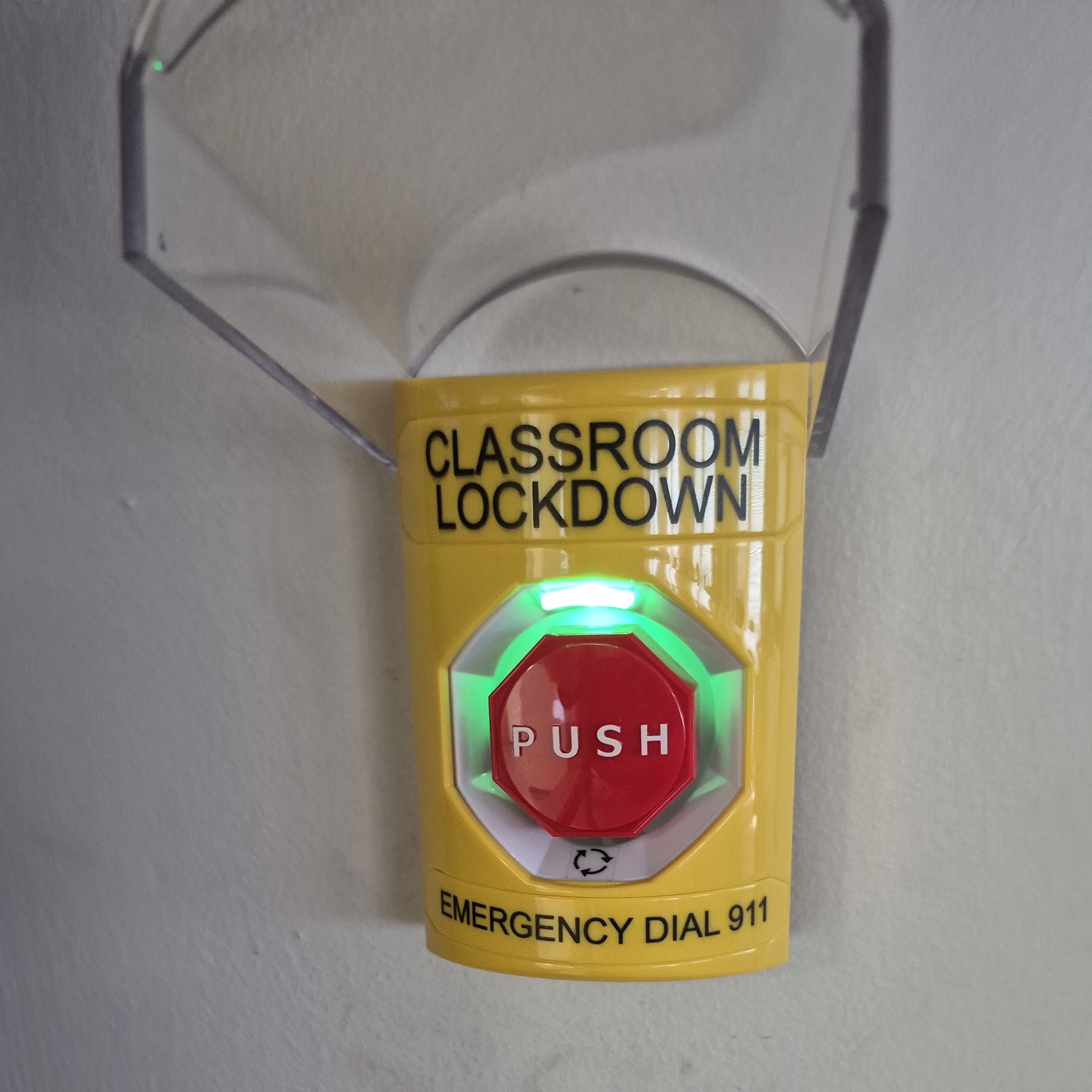
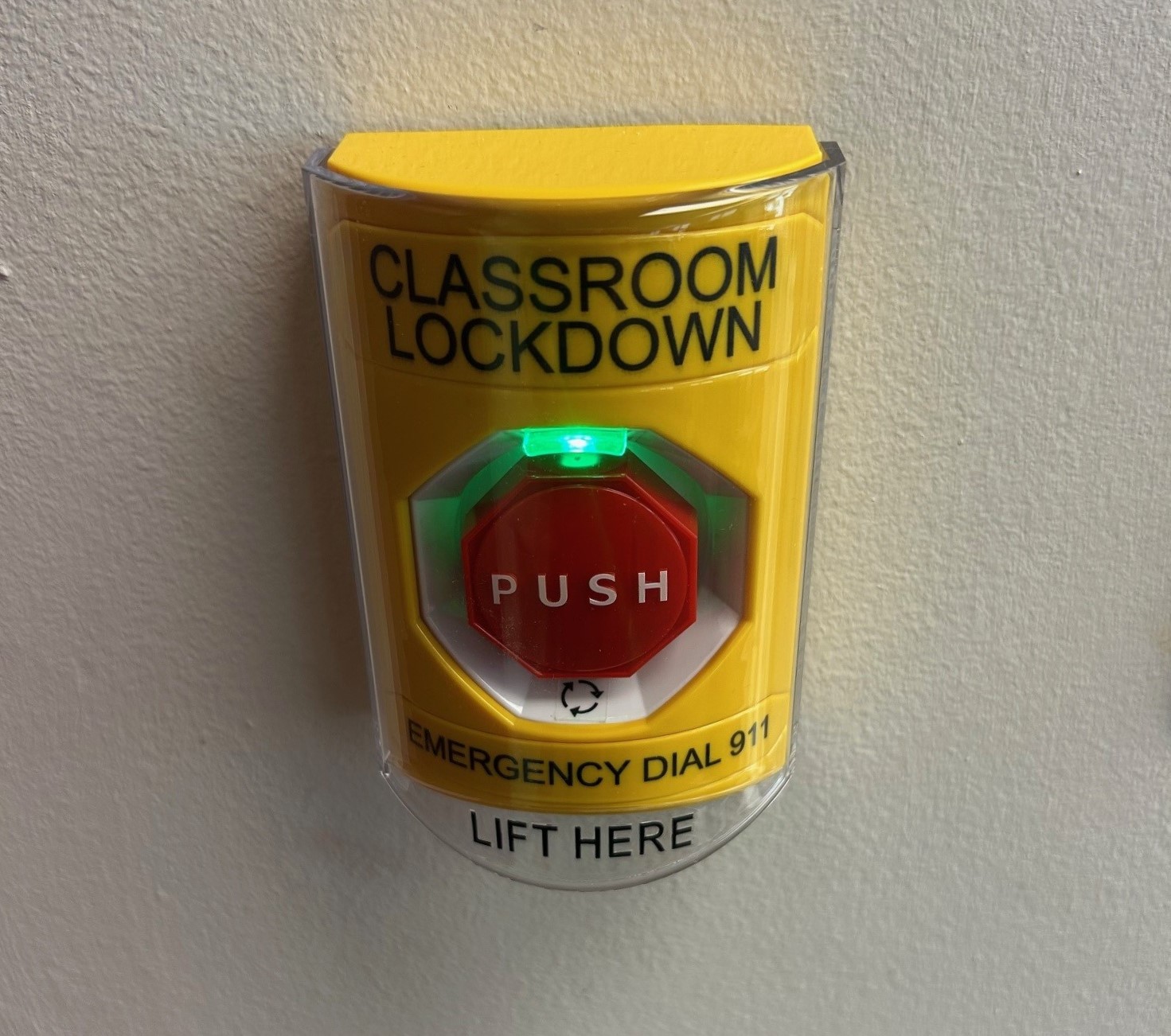
2. Activate the Lockdown Button: In the event of an emergency that requires immediate lockdown, press the Lockdown Button. This will:
- Lock All Access Points: Secure all card access controlled doors in the vicinity, preventing unauthorized entry.
- Notify Police: Send an immediate alert to university police with your location and the nature of the emergency.
3. Secure Your Location: After activating the Lockdown Button, follow these additional steps to ensure your safety:
- Turn Off Lights: Turn off all lights and close any blinds or curtains.
- Silence Devices: Silence your cell phone and other electronic devices to avoid drawing attention.
- Stay Quiet: Remain as quiet as possible and do not leave your secure location until you receive an official "all clear" notification from university police or law enforcement.
4. Communication: Use text messages or social media to communicate your status to family and friends but avoid making phone calls unless it is an emergency.
5. Follow Instructions: Follow any additional instructions provided by law enforcement. Do not leave your secure location until you receive their official direction to do so.
Panic Buttons (Blue Case)
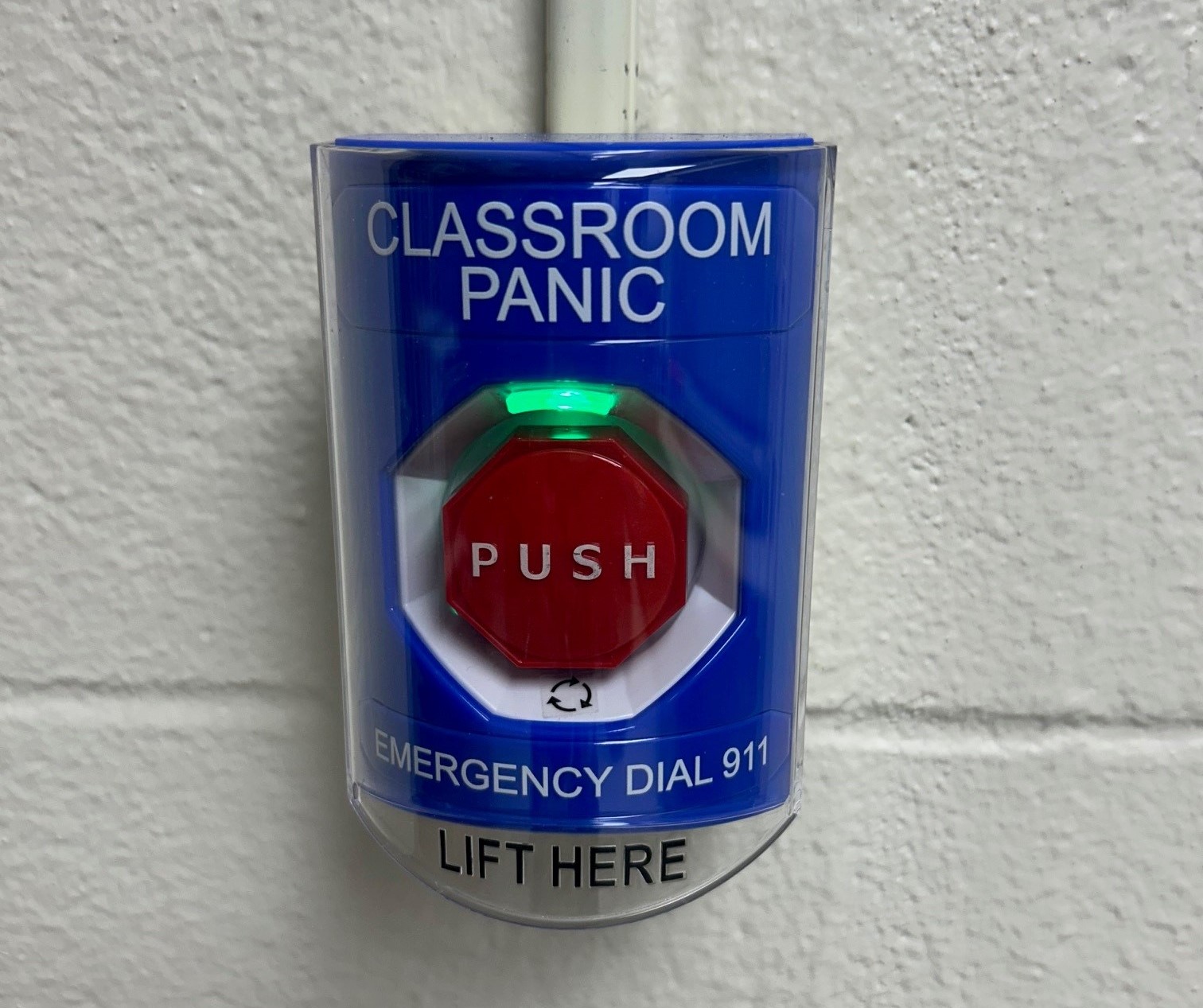
Reminder: Panic Buttons cannot remotely lock classroom or office doors, they only alert FSUPD of an active threat.
After pushing a Panic Button, use the physical locks on your doors to ensure your room is secure.
These buttons are not for medical emergencies - call 911 and request medical assistance instead of pushing the button.
The university has installed Panic Buttons in various locations across the campus to provide immediate assistance in case of an emergency. These buttons are housed in blue enclosures and are designed to immediately alert university police of an emergency. Follow these steps when using a Panic Button:
1. Locate the Panic Button: Familiarize yourself with the locations of Panic Buttons. These buttons are typically located in classrooms.
2. Activate the Panic Button: In the event of an emergency, press the Panic Button to alert university police. The Panic Button will:
- Send an Immediate Alert: Notify university police with your location and the nature of the emergency.
3. Secure Your Location: If possible, manually lock doors and secure your area after pressing the button. Follow these additional steps to ensure your safety:
- Turn Off Lights: Turn off all lights and close any blinds or curtains.
- Silence Devices: Silence your cell phone and other electronic devices to avoid drawing attention.
- Stay Quiet: Remain as quiet as possible and do not leave your secure location until you receive an notification from university police or law enforcement.
4. Communication: Use text messages or social media to communicate your status to family and friends but avoid making phone calls unless it is an emergency.
5. Stay Safe: Remain in a safe location until university police or law enforcement arrives and provide further instructions.
6. Report: After the situation is resolved, report any additional details to university police to assist with their response and investigation.
Severe Weather
More Information on for Specific Weather Hazards - NWS Weather Safety
Tropical Storms & Hurricanes
Tornadoes
Thunderstorms
Flooding
Lightning
Drought & Wildfire
Extreme Temperatures: Heat & Cold
2024-2025 Leon County Disaster Guide
After an Alert:
Seek Shelter:
- Move to designated safe areas or interior rooms away from windows during severe weather, such as bathrooms and locker rooms.
- Avoid large open spaces and stay low to the ground.
Stay Informed:
- Check the local weather station or stay connected to reliable weather updates from FSU Alerts.
- Be aware of changing weather conditions.
During Severe Weather:
Stay Alert:
- Protect yourself from flying debris and seek shelter in low-lying areas.
- Stay away from downed power lines or electrical cables in standing water
- Follow official communication channels for real-time information.
Take Shelter:
- Take shelter in sturdy buildings or designated storm shelters.
- Avoid sheltering under trees or in open fields.
Power Outage Response:
Report Power Outage:
- Immediately report power outages to campus facilities management 850-644-2424.
- Stay away from standing water and be wary of power surges when electricity is regained.
Use Emergency Lighting:
- Use flashlights instead of candles to avoid fire hazards.
- Ensure emergency lighting is available in designated shelters.
After Severe Weather:
Remain In Your Shelter Location:
- Wait for warnings to expire or for conditions to improve.
- Be cautious of hazards like downed power lines and debris.
Check for Updates:
- Stay updated on post-weather conditions and any further alerts.
- Follow guidance from emergency services and campus officials.
Reporting Incidents:
- Report any hazardous conditions or emergencies to FSUPD at 850-644-1234 or call 911.
- For general damages call FSU Facilites at 850-644-2424
Active Assailant/ Active Shooter
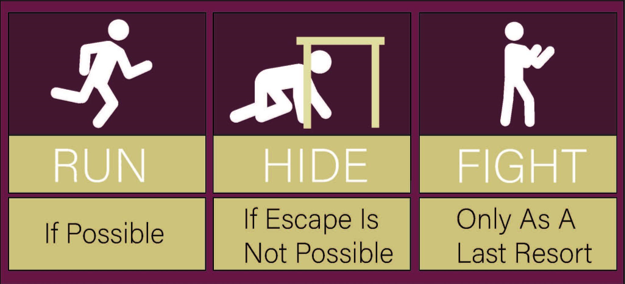
Watch the FSUPD training video Surviving an Active Shooter Event | Florida State University Police Department Request in-person Run. Hide Fight. training from FSUPD.
Always remember to call or text 911 to call for emergency assistance.
- Escape the area immediately if it is safe to do so.
- Leave belongings behind and encourage others to do the same.
- Choose the safest route, avoid elevators, and head to an exit.
Hide:
- If evacuation is not possible, find a secure hiding place.
- Lock or barricade ALL doors, turn off lights, and stay away from windows.
- Silence electronic devices and remain quiet.
Fight:
- As a last resort, be prepared to confront the shooter.
- Act aggressively, using improvised weapons if necessary.
- Work as a group if possible, overwhelm the shooter, and commit to your actions.
Additional Action Steps:
- Stay aware of your surroundings and have an exit plan.
- Call emergency services as soon as it is safe to do so and provide assistance to others.
- Provide information to authorities about the shooter's location, appearance, and weapons.
Follow law enforcement instructions carefully when they arrive.
Fire Safety & Evacuations
Campus Evacuation
Depending on the nature of the emergency, the university may decide to close campus and request all persons evacuate their buildings and move off-campus. Notifications of campus evacuations may be sent via an official source to your FSU email or via the FSU Alert Emergency Notification & Warning System. Additional information regarding class cancellations, prolonged campus closures, and campus reopening will be communicated with students, faculty, and staff as quickly as possible.
If a full or partial campus evacuation is announced, remain calm and follow directions of first responders and public safety personnel. This may involve leaving on foot or via personal or provided transportation.
Those with vehicles or other means of transportation:
- Move off-campus following guidance provided by first responders and public safety personnel in a safe and timely manner.
- Please consider bringing classmates, roommates, or coworkers with you as you leave campus when appropriate.
Those without a means of transportation:
- For emergency events with no prior warning, the university will coordinate resources to transport students, faculty, and staff to an area(s) of refuge if necessary.
- Stay up to date with FSU Alert and/or your FSU email for announcements about areas of refuge, transportation options, and other relevant information.
On-campus residents:
- University Housing and Resident Assistants (RAs) will communicate with on-campus residents about university evacuations and procedures.
- If leaving campus, tell your RA when you are leaving and where you are going.
- If time allows:
- Take all important items with you, such as medications, jewelry, passports, and other documents or valuables.
- Unplug electronics and chargers.
- Remove perishable items from refrigerators in case of power outages. Leave refrigerators plugged in, but place towels by the refrigerator door to soak up melted ice and leaking water if the unit defrosts.
All students, faculty, and staff are encouraged to have an emergency plan when required to evacuate. This includes:
- Identify somewhere to go off-campus and/or away from the affected area.
- Have a way to get to this off-campus location.
- Make a plan to tell family, friends, roommates, etc. where you are, where you are going, and when you may arrive there.
- Keep official identification on you, like a driver's license and/or FSU Card.
Building Evacuation
When Evacuating
Notify Authorities:
- If you need assistance, notify FSUPD at 850-644-1234 or call 911.
- Ask others leaving the building to notify emergency responders that a physically disabled person needs assistance evacuating and notify of the specific location.
Remain Calm:
- Remain calm and proceed to the nearest exit marked with red EXIT signs
- Proceed to evacuate immediately as a fire alarm sounds or official alerts indicate to do so
Use Designated Exits:
- Follow marked evacuation routes
- Do not use elevators during an evacuation.
- Once outside, remain with your group and wait for further instructions.
Assisting those with Access and Functional Needs in Evacuations
Assisting Disabled Persons:
Locate accessible paths to and from your buildings with the 3D FSU campus map.
Stay Together:
- Disabled persons and their Disability Buddies should evacuate together using the nearest exit if possible.
- Locate accessible paths to and from your buildings with the 3D FSU campus map.
- If not on the ground floor, wait to the side of the stairwell and notify authorities if assistance is needed.
- Some locations may have a stair chair for wheelchair evacuation. Check for these in buildings you frequent.
If Waiting Is Not An Option:
- Ask for two physically capable people to assist in evacuating the disabled
- Ask how they can best be assisted or moved, and if they require special considerations or items that need to come with them.
- Do not use elevators unless told to do so by emergency responders.
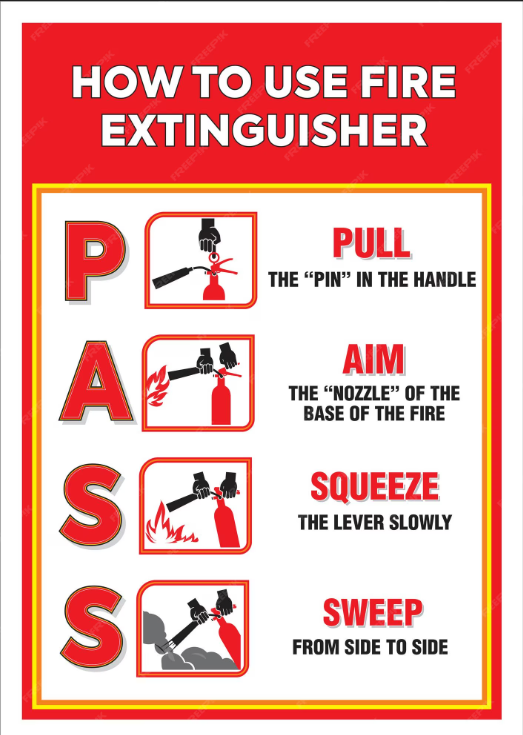
- Stay Calm and Prioritize Safety
- Keep calm and focus on your safety and the safety of others.
- React Promptly, as every second counts during a fire emergency.
- If able, safely put out the flames or contain the smoke.
- Close interior and fire doors, and utilize fire suppression, if trained to do so.
- Sound the Alarm
- Immediately activate the fire alarm system, if available.
- Alert others by yelling "FIRE" to ensure everyone is aware.
- Evacuate Quickly and Safely
- Leave the building immediately using the nearest exit.
- Do not use elevators during a fire; use stairs instead.
- See the Access and Functional Needs section for more details on assisting those with disabilities.
- Stay Low in Smoke
- If smoke is present, stay low to the ground where the air is clear.
- Crawl if necessary to avoid inhaling smoke
- Feel Closed Doors
- Before opening any doors, feel them with the back of your hand.
- If a door is hot, do not open it; find an alternative route.
- Use a Wet Cloth to Breath
- If trapped in smoke, use a wet cloth to cover your nose and mouth.
- Signal for help from windows if needed.
- Meet at a Designated Safe Area
- Have a predetermined meeting point away from the building.
- Account for all individuals and report any missing persons to emergency responders.
- Do NOT Go Back Inside
- Once safely outside, do not re-enter the building.
- Allow trained firefighters to handle the situation.
- Call Emergency Services
- Dail 911 or the local emergency number to report the fire.
- Provide detailed information about the location and situation.
Tornadoes
All faculty and staff should alert those around in their area of the hazard and direct them to shelter, following the guidance below.
During a tornado:
2. Avoid structures like trailers, mobile homes, or sheds, as they are not considered safe shelters.
3. In a dormitory or apartment, go to the lowest floor, preferably a small center room, interior stairwell, or hallway with no windows. Crouch low, facing down, and cover your head. Consider using thick padding for protection.
4. In an office/classroom building, head to an enclosed, windowless area in the center, away from glass, on the lowest floor. Crouch down and cover your head. Interior hallways with closed doors or stairwells are suitable alternatives.
5. In an open outdoor setting, seek shelter in a sturdy building if possible or stationary car if no buildings are available.
6. If caught in a car outside, safe options are limited, seek shelter in a sturdy building or parking garage. If unable, park safely, keep seatbelts on, put your head below windows, and cover with hands or a cushion. If conditions allow, leave the car and lie in a low area.
7.Monitor different notification outlets, Emergency Alert System (EAS), Weather Radios, FSU ALERT, and notifications from local authorities for emergency information.
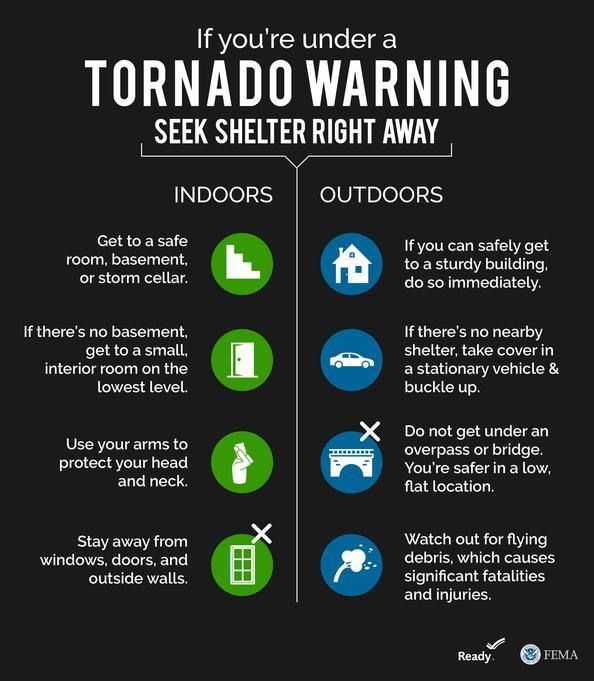
After a tornado:
1. Stay updated with Emergency Alert System (EAS), Weather Radios, FSU ALERT, and local authorities.
2. If trapped, use a cloth or mask to avoid breathing dust and try alternative communication methods like texting, banging, or whistling.
3. Avoid fallen utility lines.
4. Wait for authorities to declare damaged buildings safe before entering.
5. Use text messaging or social media for communication, saving phone calls for emergencies.
6. Report any hazardous conditions or emergencies to FSUPD at 850-644-1234 or call 911. Report general damages to FSU Facilities at 850-644-2424.
Medical Emergencies
Call 911 Immediately if the Individual:
- Is not breathing or has difficulty breathing.
- Experiences chest pain.
- Is unconscious or unresponsive.
- Suffers sudden dizziness, difficulty speaking, or a change in mental status.
- Exhibits heavy bleeding that cannot be controlled.
- Is involved in drowning, choking, severe burns, or a head injury.
Until Help Arrives:
Assess the Area:
- Check for potential hazards (Downed power lines, smoke, traffic, etc.) and take steps to protect the patient, yourself, and others.
- Do not compromise your own safety while assisting the patient.
- Locate First Aid Kits, AEDs, or STB Kits in your building
Remain Calm:
- Stay calm and help reassure the patient and those around you.
- Keeping a level head contributes to a more effective response.
Patient Movement:
- Do not move the patient unless it is necessary for safety reasons.
- If unsure, wait for professional medical assistance.
First Aid:
- If trained, use pressure to control bleeding. Stay aware of blood borne pathogens.
- Provide basic life support (CPR) if necessary.
- Stop any injuries from bleeding by using any fabrics on hand - do not remove any impaled objects.
Spotting Alcohol Poisoning and Overdose:
- Watch for excessive intoxication, inability to stay awake, irregular breathing or pulse, clammy skin, vomiting, seizures, and lack of responsiveness.
- If you identify these signs and believe they may be suffering from an overdose or alcohol poisoning, call 911 for help and stay with the person, turning them on their side and keeping their airway open.
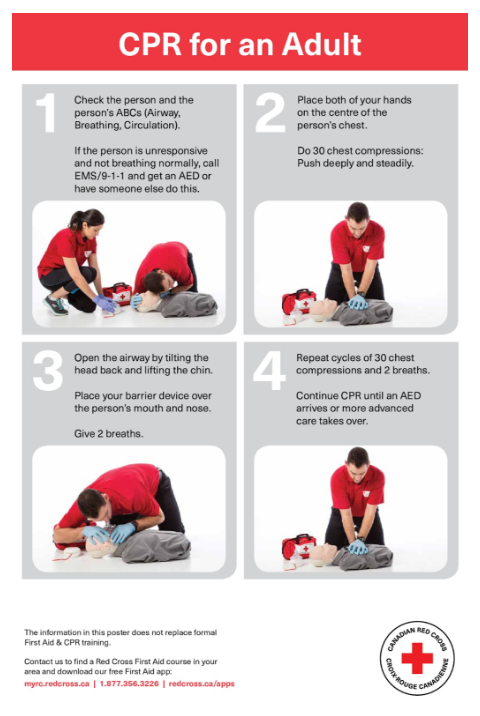
Bomb & Phone Threats
Phone Call Threats/ Swatting Calls
Stay on the Line:
Keep the caller on the line as long as possible without directly challenging them.
Note details like voice characteristics, background noises, and any information about the threat.
Ask someone nearby to call 911 or text the authorities from a different phone.
Information Gathering:
Ask specific questions about the bomb's location, type, and time of detonation.
Pay attention to details that can assist authorities in assessing the threat.
Document Details:
Document the caller's number, if available.
Note the time and any other relevant details during the call.
Swatting Calls:
Swatting calls are fake reports or threats intended to prompt immediate law enforcement response.
Find more information on identifying swatting calls and a bomb threat checklist here.
Finding a Bomb/ Suspicious Packages
- Do Not Touch:
- If you discover a suspicious object or potential bomb, do not touch or handle it.
- Clear the area and report the finding to authorities immediately.
- Evacuate Safely:
- Evacuate the immediate vicinity and follow established evacuation procedures.
- Keep a safe distance from the potential threat.
- Report to Authorities:
- Provide information to law enforcement about the location and appearance of the suspected bomb.
- Follow any instructions given by authorities.
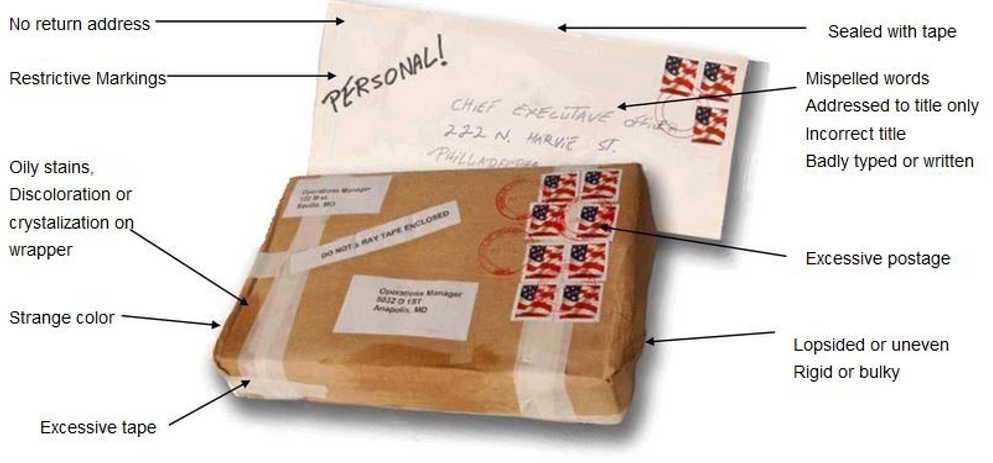
Civil Unrest
Report any incidents or suspicious activities to FSUPD at 850-644-1234 or Call 911.
Situational Awareness:
Stay Informed:
- Regularly check official university communication channels and local new sources.
- Be aware of any potential events or gatherings that may escalate.
Emergency Notifications:
- Be watchful for messages from FSU Alerts, the university emergency alert system, to receive timely updates and protective actions.
- Follow official social media accounts from the university and FSU Emergency Management for real time updates:
- FSU Alerts Social Media
- Official University Social Media:
- Instagram @floridastateuniversity
- Facebook @ FloridaStateUniversity
- Twitter @FloridaStateUniversity
- Seminole SAFE Social Media
- Instagram @KeepFSUSafe
- X (formally Twitter) @KeepFSUSafe
- Facebook @SeminoleSafe
.
During Civil Unrest:
Remain Calm:
- Stay calm and encourage others to do the same.
- Avoid areas of unrest and engaging in confrontations.
Seek Shelter:
- If violence erupts, seek shelter in a secure location.
- Help others escape, if possible. Leave the area regardless of whether others agree to follow.
- Avoid windows and doors, and lock or barricade them if threatened.
Stay Inside:
- Stay inside until university officials or law enforcement declare it safe to leave.
- Keep doors locked and stay away from entrances.
Communication:
- Communicate quietly with others in your location.
- Do not disclose your location on social media.
- Check alerts.fsu.edu for university updates & recommended protective actions.
If Caught Outside:
Find Safe Shelter:
- Seek refuge in a nearby building or a safe location away from the unrest.
- Avoid large crowds and areas of potential conflict.
- If caught in a crowd, remain non-confrontational.
Observe and Report:
- If it is safe, observe and report any incidents to law enforcement.
- Keep a safe distance from the unrest and follow instructions from law enforcement.
After the Event:
Stay Informed:
- Monitor official communication channels for updates on the situation.
- Follow any instructions from university officials and law enforcement.
Community Support:
- Reach out to support services provided by the university if needed.
- Stay connected with fellow students and faculty for mutual support.
Hazardous Materials/ Chemical Spills
CALL 911 & Follow your lab's emergency procedures.
Note: Remember that for some chemicals, such as hydrofluoric acid, effects resulting from exposure may not become apparent until hours or days later. Consult the SDS for any chemical to which someone has been exposed, even if no immediate injury is apparent.
Florida Poison Information Center: 1-800-222-1222. Contact EH&S at 644-0971 or 644-7682
Chemical Emergencies, Exposures, and Spills.pdf (fsu.edu)
Provide First Aid:
- Eye Contact:
- Wash the eyes and inner eyelids with water for at least 15 minutes.
- Remove contact lenses and seek immediate medical attention.
- Ingestion:
- Consult Safety Data Sheet (SDS) or a chemical first aid manual.
- Call Poison Information Center (1-800-222-1222) or seek medical attention immediately.
- Minor Skin Contact:
- Flush affected area with water; remove contaminated clothing.
- Seek medical attention if symptoms persist.
- Major Skin Contact:
- Remove contaminated clothing while shower using mild detergent or soap and water to wash off chemicals.
- Do not neutralize chemicals or apply salves.
- Seek immediate medical attention. Call 911.
- Fire:
- For clothing on fire, help the person to the floor and roll to smother flames.
- Use safety shower or fire blanket. Seek medical attention.
- Note:
- Effects may not be immediate; consult the Health and Wellness Center or Emergency Medical Services even without apparent injury.
- Contact Environmental Health & Safety or trained laboratory staff to contain the spill and lock down the area.
Sexual Assault & Battery
We listen. We learn. We care. We respond.
Florida State handles sexual misconduct complaints sensitively and discreetly; we are all responsible for providing a supportive environment for those in need and for reporting misconduct. If you have experienced sexual misconduct or know someone who has, FSU is committed to providing support and resources to assist. We do not tolerate sexual misconduct. Go to Know More (fsu.edu) for more information and to file a report.
Get Help Now (* Confidential)
FSUPD
(850) 644-1234
For emergencies call 911
UNIVERSITY COUNSELING & PSYCHOLOGICAL SERVICES
(850) 644-TALK (8255) * (24/7)
VICTIM ADVOCATE PROGRAM
(850) 644-7161 (24/7, including holidays)
(850) 756-4320 (text)
REFUGE HOUSE (OFF-CAMPUS RESOURCE)
(850) 681-2111 *
TITLE IX OFFICE (resources & FSU policy 2-2 Anti- Sexual Misconduct)
Terri Brown, Title IX Director/Coordinator
Phone: (850) 645-2741
Students/Employees in Distress
FSU Department of Student Support and Transitions provides case management services for all current students. Report.fsu.edu allows you to share important information regarding incidents or concerning behavior happening in the Florida State University community.
Assisting Distressed Students Guide
Employee Assistance Program (EAP) The EAP is a free, confidential program providing a professional support system for the faculty and staff of the university. Since its inception in 1995, the EAP has assisted thousands of employees through professional, personal and family issues.


